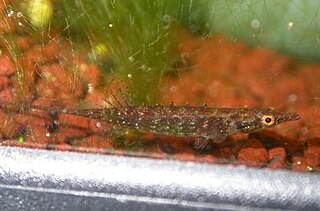
Haemulidae is a family of fishes in the order Perciformes known commonly as grunts. It is made up of the two subfamilies Haemulinae (grunters) and Plectorhynchinae (sweetlips), which in turn contain about 133 species in 19 genera. These fish are found in tropical fresh, brackish, and salt waters around the world. They are bottom-feeding predators, and named for the ability of Haemulinae to produce sound by grinding their teeth. They also engage in mutualistic relationship with cleaner gobies of genus Elacatinus, allowing them to feed on ectoparasites on their bodies.

Conodon is a genus of grunts native to the Pacific and Atlantic coasts of the Americas. The currently recognized species in this genus are:

Indostomus is a genus of small fishes native to slow moving or stagnant freshwater habitats in Indochina. It is the sole genus of the monogeneric family Indostomidae, Long considered to be sticklebacks, within the order Gasterosteiformes, modern analyses place the Indostomids within the order Synbranchiformes, related to the spiny eels and swamp eels.

Pomadasys commersonnii, the smallspotted grunter, is a species of ray-finned fish, a grunt belonging to the family Haemulidae. It is native to the brackish and marine waters of the western Indian Ocean.

The bigeye grunt is a species of marine ray-finned fish, a grunt belonging to the family Haemulidae. It is native to the Atlantic coast of Africa.

Diagramma is a genus of marine ray-finned fishes belonging to the family Haemulidae, grunts native to the Indian Ocean and the western Pacific Ocean. The currently recognized species in this genus are:
Haemulopsis is a genus of marine ray-finned fish, grunts belonging to the family Haemulidae. They are native to the western Atlantic Ocean and, mainly, to the eastern Pacific Ocean.
The dara is a species of marine ray-finned fish, a grunt belonging to the family Haemulidae. It is native to the Atlantic coast of Africa. It is the only species in the monospecific genus Parakuhlia.

Pomadasys is a genus of grunts native to the waters of the eastern Atlantic Ocean and through the Indian Ocean to the Pacific coast of the Americas. The name of this genus is a compound of poma meaning "lid" or "covering" and dasys meaning "rough", a reference to the serrated preopercle.

Xenistius is a genus of grunts native to the eastern Pacific Ocean.

Xenocys jessiae, the black-striped salema, is a species of marine ray-finned fish, a grunt belonging to the family Haemulidae. It is endemic to the eastern Pacific Ocean.

Haemulon chrysargyreum, the smallmouth grunt, bronze grunt, or yellowstripe grunt, is a species of marine ray-finned fish, a grunt belonging to the family Haemulidae. It is found in the western Atlantic Ocean.

Pomadasys kaakan, the javelin grunter or barred javelin is a species of marine ray-finned fish, a grunt belonging to the family Haemulidae. It is native to the Indian and Pacific Oceans, from Africa to Australia.

Haemulinae is a subfamily of the Haemulidae and consists of the genera of that family which are regarded as being of New World origin, although they are now widespread. The subfamily is distinguished from the Plectorhynchinae by having a short dorsal fin which contains 13-16 soft rays, as opposed to the long dorsal fin with 17-26 soft rays of the subfamily Plectorhynchinae.

Plectorhinchinae, is one of two subfamilies of the family Haemulidae, some known colloquially as sweetlips. This subfamily is regarded as having an Old World origin.
Pomadasys macracanthus, the longspined grunt or Mexican gray perch, is a species of marine ray-finned fish, a grunt belonging to the family Haemulidae. It is native to the Eastern Pacific from Mexico to Ecuador.

Brachygenys is a genus of marine ray-finned fish, grunts belonging to the family Haemulidae. The species within the genus are found in the eastern Pacific Ocean and western Atlantic Ocean. It is not yet recognised by Fishbase but is by the Catalog of Fishes.

Pomadasys argenteus, the silver grunt, silver javelin, grunter bream, small-spotted grunter-bream, small-spotted javelin fish, trumpeter or white-finned javelin fish, is a species of marine ray-finned fish, a grunt from the family Haemulidae. This species has a wide Indo-Pacific distribution. It is the type species of the genus Pomadasys.

Rhonciscus is a genus of marine ray-finned fish, grunts belonging to the family Haemulidae. The species within the genus are found in the eastern Pacific and western Atlantic Ocean. It is not yet recognised by Fishbase but is by the Catalog of Fishes.
Bentartia is a genus of marine ray-finned fish belonging to the family Zoarcidae, the eelpouts. Some authorities treat this genus as monospecific, with the only species being Bentartia cinerea of the Southern Ocean, but other authorities include 4 species from the eastern Pacific Ocean.












